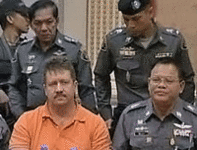USA is about to win the fight for Merchant of Death
 Viktor Bout will most likely be delivered to the USA. On October 5th, a Thai court found new charges for Bout's extradition to the United States insufficient. Viktor Bout's defense intends to appeal against the ruling not to have the client delivered to the USA. His lawyers have three days for that.
Viktor Bout will most likely be delivered to the USA. On October 5th, a Thai court found new charges for Bout's extradition to the United States insufficient. Viktor Bout's defense intends to appeal against the ruling not to have the client delivered to the USA. His lawyers have three days for that.
According to the laws of Thailand, the participant of the present court proceedings can not be extradited upon the request from another country - the United States. On August 20, Thailand's judicial authorities decided to extradite Bout to the USA after two years of legal proceedings. To be on the safe side, the Americans set forth new accusations - swindling - on August 24.
What is going to happen to the "Merchant of Death?" Bout's lawyers find it difficult to predict their client's future because he is no longer under investigation. Bangkok can already begin Bout's extradition to the United States.
Russia Today: Bout's defense fight to delay extradition
Scientist of politics Maksim Shevchenko believes that Viktor Bout's case is all about politics and nothing else.
"This is all about politics. This case is yet another proof of the fact that the Americans consider all other countries, except for the USA, as a territory of barbarians, whom they treat in a barbarian way too violating human rights. Bout has been charged with illegal arms trade. But the USA sell their arms to most extreme regimes and groups and cooperate with tyrants like Angola's Savimbi," the specialist said.
Pavel Zolotarev, deputy director of the Institute for the USA and Canada, shares a different opinion.
"I do not think that this is a purely political case. Which goals would the Americans pursue here? Would they want to obtain an opportunity for putting pressure on the Russian administration? But it's like as if they would like to scratch the left ear with the right leg. Washington has other more convenient option to do it," he said.
Whatever the case, Bout may face life in prison in the United States for illegal arms trade. Bout was detained in Bangkok in March 2008 at the request from US special services. Washington accused the businessman of violating the UN embargo on arms shipments in Africa's conflict zones.
As Pravda.Ru has reported before, US special services organized a provocation to arrest the Russian businessman. They introduced themselves as emissaries of FARC - the Colombian organization, which Washington considers a terrorist group. The "emissaries" set out a wish to purchase several helicopters and shoulder-carried missile systems. Bout agreed and was arrested.
The authorities of Thailand showed mixed reactions to the case. At first, Thai judges considered that the arguments from US prosecutors were fair. However, they changed their point of view in August 2009. They said that Thailand did not consider FARC a terrorist group, therefore, the nation did not have any claims against the arrested Russian businessman. As a result, Thailand refused to deliver Viktor Bout to the United States.
Bout himself does not accept this demonic image. He stated previously that he owned an air carrier and was dealing with cargo transportations all over the world. However, the West takes those activities as a cover up to illegal arms trade.
Viktor Bout was born on January 13, 1967 in Dushanbe. He graduated from the Moscow Institute of Foreign Languages. Bout is fluent in six foreign languages. Until 1991, he worked as an interpreter in Africa, where he originally established necessary connections for his future business.
Bout was put on international wanted list in 2002. In May of 2002, London asked Moscow to take measures to have the businessman arrested. In 2006, the UN announced that an illegal cartel was supplying weapons to rebels in Angola, Congo, Liberia, Sierra-Leone and Togo in return to blood diamonds. According to Brussels, financial operations were performed in Antwerp, Belgium, which is an international center for diamond trade.
A 2000 United Nations report states that, "...Bulgarian arms manufacturing companies had exported large quantities of different types of weapons between 1996 and 1998 on the basis of (forged) end-user certificates from Togo." And that, "...with only one exception, the company Air Cess, owned by Victor Bout, was the main transporter of these weapons from Burgas airport in Bulgaria." These weapons may have been destined for use by Uniao Nacional para a Independencia Total de Angola (UNITA), one faction in Angola's 1975-2002 civil war.
It is worthy of note that Interpol's bureau in Russia said that the search for the arms dealer began in 1995, and Russia put Viktor Bout on wanted list in 1999. Leonid Ivashov, a well-known Russian military official, also said once that Bout was dealing with illegal arms sales, although he added that it was incorrect to trace Russian authorities in his activities.
Viktor Bout's case is not the first one that triggered an international arms scandal. Jean-Christophe Mitterrand, son of the former French president Francois Mitterrand, as well as son of British leader Margaret Thatcher, caused quite a commotion when they were put on trial for illegal arms sales.
Sergey Balmasov
Pravda.Ru
Subscribe to Pravda.Ru Telegram channel, Facebook, RSS!





